|
COVER STORY | IN
THE NEWS | STAGE
MATTERS | OFF
THE PAVEMENT September 28, 2006
The sun shone brightly on the 33rd annual North Country Fair, a long-standing community tradition that locals have been enjoying pretty much every year since its inception in the early '70s. It always seems the perfect way to end the summer, a gathering of artists, musicians and dancers that draws people out of the woodwork for a weekend of food, drink, dancing and socialization. Friends run into old friends they haven't seen all year. At a glance, this year's fair didn't seem much different from years past. There was music in the air all day, belly dancers and parades, kids bouncing around, moms carrying wax hands, folks trumpeting one cause or another, shoppers perusing the usual assortment of arts and crafts -- pottery, paintings, photos and jewelry. One could find the same old lemonade stand, hot dog booth, Indian tacos, a couple of places selling Southeast Asian or African food, and beer on two corners. But there was a hint that something was amiss when
the drum and dance troupe Samba De Alegria stood ready to circle
the Plaza for Saturday's Samba Parade. The Steve Watts Band was
still pumping out rock `n' roll on the stage nearby and did not
particularly want to stop. After all, the start time for the
set had been pushed back, as had all of the music Saturday since
the whole show started 45 minutes late. As the distinct Brazilian
rhythm This year the North Country Fair was very different, but not in a way that most fairgoers would notice. The "Same Old People" who'd run the fair more or less since the start were gone, replaced by new management in the person of Washington Vera, a local concert promoter with a less-than-stellar reputation among those in the local live music scene -- a reputation for cutting corners and promising things he doesn't deliver. Right: Imported goods from China. Vera claims he is just applying smart business practices to the operation of the fair. After all, it is a private enterprise that he now owns. But so many things went wrong with this year's North Country Fair, so many people were pissed off, that it has created an undercurrent of discontent that threatens the very soul of the event. On my way to town that Saturday morning I ran into a couple I've known since they were teenagers. Brian and Lisa Finigan had parked on the 11th Street bridge and were headed to the fair with their granddaughter and youngest daughter. As we walked along I asked a question I repeated many times over the next few days: "Who do you think runs the North Country Fair?" Brian admitted he'd never thought much about it. "Maybe the merchants," suggested his daughter. Brian figured it was "some community group that gets together each year."
Left: All Species Parade in 1987. From the Book The North Country Fair: A Collective Memory, published in 1993. Arriving at the Plaza, I came across an old friend. As we began talking, Vera appeared on the corner leading a pack of young people in matching blue caps and tan T-shirts that identified them as California Conservation Corps volunteers. Vera was training them for trash duty, just one of their responsibilities. More blue-capped volunteers were handling security at the various entrances, stopping people with dogs, bicycles or obvious signs of outside alcohol. Vera skittered off leaving the CCC volunteers standing about and I resumed my conversation with my friend Susan Anderson, who was once one of the Same Old People (S.O.P.), the shifting group of community volunteers who helped keep the event operating since the beginning. Anderson and her former partner Chris Ursich sold blackberry popsicles at the fair for many years, and served on the S.O.P. crafts jury, deciding if a given artisan's wares were up to snuff and worthy of inclusion. Susan detailed how the standards changed over time, an ebb and flow of looseness and tightening, particularly after the event was listed in The Crafts Report Magazine, an industry newsletter that attracted crafters from out of the area. "It got much bigger," she said, and there were fewer local handmade crafts and more imports. "Eventually we had to institute a no-imports rule," which she noted did not seem to be in place this year. On the other side of the Plaza I ran into Ursich. We reminisced about the history of the fair which, he recalled, was started in 1974 by a pair of poets, Jerry Martien and John Ross. "Talk to Jerry if you want to find out where it all started," he suggested.
The gentle, gangling poet Jerry Martien traced the origins of the event back to something called the Stop at Four Committee, a ragtag group of progressives, radicals and counterculturistas who had battled Arcata's old guard over the expansion of the stretch of highway that runs through town into a six-lane freeway. "The alternative business people were the sponsors," he recalled, not that they ever saw the fair as a business venture. "They thought their real business was public service. Money was not a primary object." It wasn't easy to pull off the first time. There was resistance to the idea in official circles and it took some "political haggling" with the city to get permission to use the Plaza. Martien and the late Jack Hitt, owner of Northtown Books, met with Arcata Police Chief Jim Gibson. He opposed the idea, but the City Council approved it anyway. Martien figures that the fact that Hitt was a local and a businessman probably turned the tide in their favor. The group opted against incorporating an official nonprofit. "We refused to do anything legal," said Martien with a laugh. After a time they dubbed the ad hoc fair committee the Same Old People, an inside joke since the membership was always changing. As the years rolled by the fair grew, going from one day to two. Meanwhile the S.O.P. "volunteer" pool shrank --paid themselves $10 an hour in those days for their fair work -- until two people, Winchell Dillenbeck and his partner Rose Wentworth remained. The duo did most of the work, bringing in help only as needed, mostly on fair weekend.
Right: All Species Parade, 2006 . "I tried to keep the fair really close to breaking even," said Cook. When costs rose, he would raise the booth fees proportionally trying to be sure to end the year with enough to get things going the following year and a reserve to cover the unexpected or the occasional slow year when expenses exceeded income. As he approached a decade on the job, Cook decided that he, too, was ready to move on. "After doing it for so many years I was just running it on autopilot in a way," he told me when I called him the day before the fair. "It felt like it needed new energy. That was my main motivation for stepping away from it." Last year he brought in Vera as fair co-manager. When it was over, he wrote Vera a check for what was left in the bank and turned over the S.O.P. name. Vera opted to drop the S.O.P. moniker ("I'm not one of the Same Old People," he explained), and filed a fictitious business notice announcing that he would be doing business as North Country Fair. Cook also had Vera sign a document outlining the director's mission -- "stewardship" of the fair, as he put it, "and the need to keep it operating as a functional nonprofit." He used the word "functional" because the fair is still not run by a 501(c)(3) organization. It might look that way -- and in theory it has always functioned that way -- but the S.O.P. never did get around to jumping through the required legal hoops.
"That's the way he does things," said Bernie Singer, one of the sound technicians for this year's North Country Fair. "He cuts corners so he can make as much money as possible. It's sad that it's happening with the fair because that wasn't what it was all about for years. It used to be about music." In the months leading up to this year's fair Vera stepped on some big toes, those of the tall, bearded Michael Welch, founder of Redwood Alliance, a grassroots nonprofit involved in energy issues. For about 20 years Welch and Redwood Alliance sold beer at the fair -- first just a little, but in recent years much more, enough to pay most of the rent on the organization's Arcata office. Considering how much they were making, Vera figured they were not putting in a fair share. As he explained after the fair, "I looked at the books to see what things really cost, going through it like a business. I realized that the North Country Fair has been paying for all these alcohol-related expenses, but Michael was not kicking in. He was walking away with all the funds for Redwood Alliance." Vera decided things had to change. In a series of e-mails to Welch he announced that the fee for the beer concession would go up this year, from $600 for two booth spaces (slightly more than other vendors pay) to $3,660 -- a six-fold increase. In an e-mail dated May 17, Vera detailed his basis for the increase: $800 for booth spaces, $750 for additional insurance "just for having beer," $500 for promotional costs, $1,610 for increased security costs, including "hourly wages, T-shirts and radio phones." Included in one note was a "negotiable" request for a $2,325 donation to the "Basic Needs Fund," an account that Vera says he recently established to benefit "those in need." Welch figured some of the numbers supplied were inflated and he was right. The city steers organizations to a company called Diversified Risk who supply a required $1 million special event insurance for events on the Plaza. The difference in cost for an event with alcohol, as opposed to one without is actually $265.16 per a day. Welch saw the dispute as more than a disagreement over money. "For 32 years the fair has been a community event, not a for-profit business." Welch was incensed when Vera told him he'd bought the fair from Cook. "[Vera] said, `I own the fair, I intend to make a profit.'" (Cook denies that he sold the fair. "It wasn't mine to sell. It belongs to the community." In fact he gave the fair and the reserve fund to Vera.) "This is a business. And it needs to be run
like one," Vera told me. "Matthew [Cook] was always
a hands-off guy. I'm a hands-on guy. That was really the reason
for the clash." Eventually Welch's response was to send Vera two checks, one for $600 and a second for $400, for two booths. Vera notified Welsh he would return the checks and instead was turning the booth over to Arcata Main Street, the merchant's group that, among other things, operates Arcata's annual Oyster Festival and its beer booths. Saturday afternoon at the fair I ran into Vera at the trash area on the corner across from Arcata Liquor as I was on my way to the stage on 9th Street where a new string band called Ukexperience was playing. He was looking a bit frazzled, showing a newly recruited volunteer how to sort recyclables. It seems his CCC trash and security crews had left early. "They had to catch their ride home at 3," he explained, adding, "We'll make do." Right: Washington Vera and volunteers. As I made the rounds touching base with old acquaintances, I heard more rumblings of dissatisfaction about the new management, mostly from folks in the music business who had dealings with Vera or from those who know Welch -- at least until Sunday. Then I started hearing from crafts vendors complaining about lack of security. According to Arcata Police Captain Tom Chapman there were just two uniformed police on Plaza duty during the fair. "It is not their job to chase dogs or to tell people they can't smoke," said Chapman in a post-fair interview. That is supposed to be the responsibility of private security hired and paid for by fair organizers. Chapman said while he was enjoying the fair off duty Saturday, he observed plenty of rules broken. "There was no signage, no private security -- not that we were able to see. Dogs were everywhere. It's part of the health permit process for food vendors that you cannot have animals around." As a result, the police captain wrote a letter Sept. 21 to Dillon Savage, interim director of Arcata Main Street, the merchant group that held the permit for the alcohol booths, noting the shortcomings in the fair's security plan. The letter is a warning that could affect Main Street's ability to have alcohol booths in the future. It turns out there was also no evidence that Vera
hired overnight security at all. Chapman said they have asked
Vera to provide specific names, but "we have not yet received
them." According to sound man, Bernie Singer, "He had
no security. In past years we've left all the equipment set up
and there were security guards roaming around [Saturday night].
This year we had to Chapman said he had two emails from the APD shift supervisor reporting numerous problems due to lack of overnight security. "There were people in and out of the booths, ripping stuff off. We had one report of stolen property -- a Coleman stove and some cases of soda," Chapman said. Left: Ya Habibi Dance Company.
On Monday after everyone had packed up and headed home, I heard from Denise Hisel, a potter from Kneeland who said she's been selling at the fair since 1979. "Back when it was one day and it cost $25 for a booth." "I don't know who ran it this year, but I could tell it was different," she began, describing it as "really disorganized" and complaining about dogs, a lack of pre-fair advertising, overflowing porta-potties and people walking around with beer from the liquor store. "And it used to be it had to be all handmade crafts. This year people had things made in Guatemala, African baskets, even sweatshirts and plastic stuff from China. It makes it more like a swap meet." Mark Cortright has been selling his Liscom Hill Pottery at the fair since it started. While he was never one of the S.O.P., he is one of the same old vendors found at the fair every year. He seconded Hisel's complaints. "The fair was going sideways. Why? Someone's taking all the money and not providing the services that we're paying for as vendors. When it starts to be about greed, it gets ugly fast." Both potters, too, complained about "inadequate security," noting that the only security in evidence was the crew from Americorps and the CCC -- and it turns out they were not even there legally. Meredith Vanden Branden, program manager for the local Americorps division said she was surprised to learn that the volunteers for the fair were working for a for-profit business venture. "We were under the impression that it was a community-based organization," she said. Phil Heidrick, residential advisor for the CCC camp in Fortuna was just as surprised. "Normally we only work for nonprofits," he said, noting that a government bus drove the volunteers to Arcata Saturday, dropping them off just before 11 a.m. They were picked up around 3 p.m., hours before the fair ended for the day.
Last Thursday, Arcata Main Street's board of directors met to mull over the fallout of this year's North Country Fair. According to acting director Savage, the board decided to draft two letters to Vera, the first regarding the long simmering complaints from Plaza business owners regarding the impact of the fair layout on access to their sales. "The fair is not inclusive of the downtown
businesses," Savage said. "The backs of the boot Right: Musician Steve Watts. Like many, Savage assumed that Vera represented a nonprofit group. "I didn't see the reason why the city would let just any old business walk in and do an event on the Plaza that has major economic impact on the town. I was wrong. We were told just a few weeks before the event that they definitely were not a 501(c)(3)." The merchant group is also angry about the money they shelled out for the beer booths. "We paid for security guards to be there and they weren't there. People questioned that and it looks bad on us, not on them. Where did the money go?" Savage says he confronted Vera at the end of the day Saturday complaining that he'd paid for 15-20 security guards and saw none while "there were people walking around with brown bags full of alcohol, which is specifically not [supposed] to happen. "All [Vera] said was, `They're here. They're just not wearing security shirts or hats and they don't have radios or anything, because I don't like that feeling of people watching over you.'" Vera conceded that he was unsure if the two overnight security guards he had hired ever showed up. He said he'd left the Plaza to attend the various benefit after-parties he organized to raise funds for the "Basic Needs Fund" before they were to come on duty at 8:30 p.m. and they were not on the Plaza when Vera arrived at 6 a.m. Sunday morning. Main Street actually ended up paying much more than Vera had asked Welch to pay -- $1,000 per booth for rent, four times as much as a typical food or beverage booth, plus $4,000 for security. "Essentially he's ripped us off," said Savage.
Why would you ask someone who had "ripped you off" to run the fair again? Savage replied: "He owns the fair. It's in his name isn't it? If there's a business license out in his name or even a fictitious name, North Country Fair, that's his name, there's not really a whole lot we can do about it, is there?" Left: Former coordinator Matthew Cook performing at the 2005 fair. He did not attend this year.
Looking ahead to next year, Vera said he's planning major changes in the structure of the fair but not necessarily those that Main Street has in mind. He's "99 percent sure" he'll eliminate all but one of the entertainment areas next year, consolidating all music and dance on one stage, thus cutting the number of acts from dozens per day to perhaps "10 or 12." He's also thinking about bringing in "name acts" from out of the area, which would mean fewer local bands. He realizes it won't make the local musicians happy and that it would likely shift some attention away from the crafts booths. "It's not going to be just a focus on a crafters fair with entertainment in a lot of places. It will become a craft fair/entertainment festival. I want to step it up a bit, bring in bigger acts to make it more of a music festival." If he does actually run the fair again he may need to bring in outside bands. In years past musicians donated their time and talent except for a small stipend. This year, many of the bands are still waiting for their compensation. "Matthew Cook always gave the bands $50 to play and the check was always presented to the band at the time of the performance -- a noble gesture, even if it's just gas money," emailed one disgruntled band member. "I'm sure there are many stories to be told," he continued. "Perhaps you could put a call out for folks to send their North Country Fair 2006 management stories in. Maybe that would inspire a coup d'etat to take back the fair. Matthew could then, upon revoking the current candidate's `probation,' select a much better alternative than what we have now. Otherwise, I fear for the fair." The potter, Cortright, agrees. "He thinks it's his fair. It's not. It's about the community -- for the people, by the people. This guy seems like a bad match for that. He doesn't understand what the fair is all about. Change needs to occur again. At least I'd like to see a change." For his part, Jerry Martien is wondering if he might have to step back into the picture. "Maybe all the old hippies will have to get together and do something as un-hippie-ish as form a nonprofit and get organized." For the first time in decades Michael Welch did not attend the North Country Fair. "I just couldn't. It would have made me too mad," he said. Since he's already an activist, he's taking action. He spent last week working the phones. On Monday he said, "There are many, including crafters, local politicians and concerned individuals who want to see the fair back in the hands of the community. I've been in contact with every former member of the Same Old People I could get hold of. They all agreed that I would be a good person to represent them in efforts to get the fair back." With that in mind, Welch has drafted a letter on behalf of the S.O.P. and he's working on an application to run a full-scale festival on the Arcata Plaza for equinox weekend September 2007.
Friday evening, a week after the fair, I ran into Vera at Live From New York, a pizza joint just off the Plaza. In between bites of a pepperoni slice, Vera said he was relieved because he'd paid all the bills and almost all of the work for this year's fair was done. All that was left was to deliver various items from the "Basic Needs Fund" silent auction, which he noted did not raise as much money as he'd hoped. I asked if he'd heard about what happened at the Main Street meeting the previous day. He said he was aware of the letters coming from Main Street and the police captain, but he seemed unfazed. "I just have to touch base with [Capt.] Chapman -- see where I fell short. Then I'll dial things in to make it better next year." Glancing at his watch, he stood up to go. He was to meet one of the auction winners on the Plaza to deliver their purchase. "And I probably won't work with Main Street again," he added. "They didn't need to make such a stink threatening lawsuits and all."
COVER STORY | IN
THE NEWS | STAGE
MATTERS | OFF
THE PAVEMENT Comments? Write a letter! © Copyright 2006, North Coast Journal, Inc. |

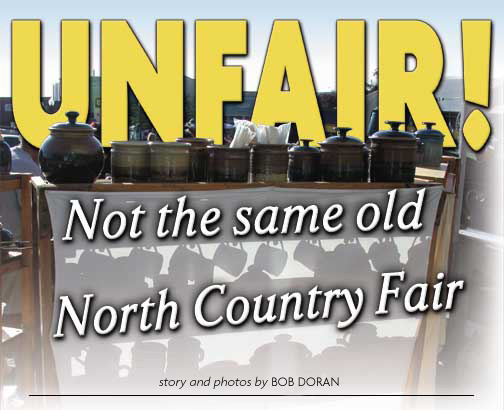
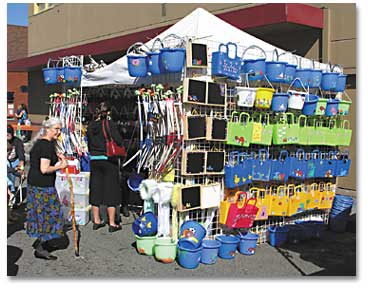 of the samba drummers
kicked in, it rudely clashed with the rock, creating a cacophony
of sound. Never mind. The parade had begun.
of the samba drummers
kicked in, it rudely clashed with the rock, creating a cacophony
of sound. Never mind. The parade had begun.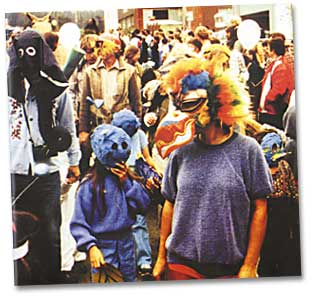 I
explained that that was the case in the beginning, but in recent
years, it's changed. Today the fair is essentially run by Washington
Vera; it's a business operating as a sole proprietorship.
I
explained that that was the case in the beginning, but in recent
years, it's changed. Today the fair is essentially run by Washington
Vera; it's a business operating as a sole proprietorship.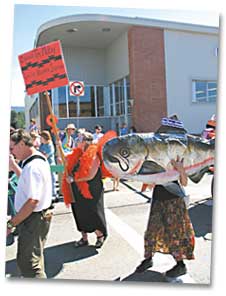 By
1995, tired of the responsibility, they ran an ad in the paper
looking for a new fair manager. Piano player Matthew Cook answered
the ad, got the job and a $4,000 yearly stipend. They showed
him the ropes and signed over the bank account and the Same Old
People business name. From that point until recently Cook was
master of the fair, and by all accounts he was a benign ruler,
a steady hand on the till dealing with the fair's $30,000 annual
budget.
By
1995, tired of the responsibility, they ran an ad in the paper
looking for a new fair manager. Piano player Matthew Cook answered
the ad, got the job and a $4,000 yearly stipend. They showed
him the ropes and signed over the bank account and the Same Old
People business name. From that point until recently Cook was
master of the fair, and by all accounts he was a benign ruler,
a steady hand on the till dealing with the fair's $30,000 annual
budget.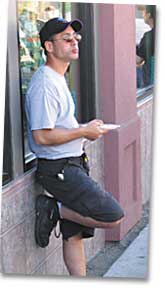 Washington Vera (left) has a long
history in Humboldt County's concert promotion scene. He is particularly
notorious among local bands, club owners and music techs he has
crossed. One Vera production, a concert at Six Rivers Brewery
in McKinleyville a few years ago, was billed as a cover band
plus a second band, yet only the cover band played and they left
after 90 minutes. A veteran sound tech for another show was replaced
by someone who would work for less money; the sound system blew
after the opening number, angering band members and the patrons
of the show.
Washington Vera (left) has a long
history in Humboldt County's concert promotion scene. He is particularly
notorious among local bands, club owners and music techs he has
crossed. One Vera production, a concert at Six Rivers Brewery
in McKinleyville a few years ago, was billed as a cover band
plus a second band, yet only the cover band played and they left
after 90 minutes. A veteran sound tech for another show was replaced
by someone who would work for less money; the sound system blew
after the opening number, angering band members and the patrons
of the show.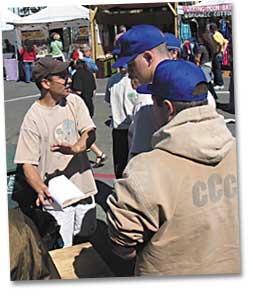
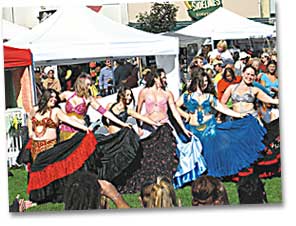 break
everything down that night and put it away."
break
everything down that night and put it away."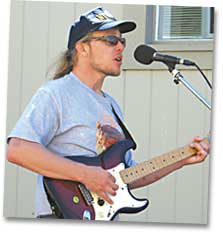 hs
are right up against the curb and there are no breaks so that
people can easily access businesses on the Plaza. It's been a
problem for a really long time." The merchants are angry
and hope they can convince the new city manager to insist on
a different layout.
hs
are right up against the curb and there are no breaks so that
people can easily access businesses on the Plaza. It's been a
problem for a really long time." The merchants are angry
and hope they can convince the new city manager to insist on
a different layout.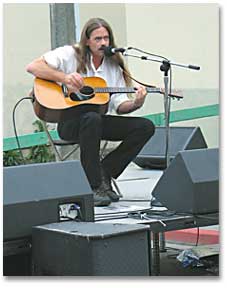 What's
next? "We're submitting a letter to him about the layout
and a letter about our security problems. The city manager was
at our board meeting this morning. The captain of the police
[Chapman] has given me a letter to attach to mine, citing the
downfalls of what was requested by the city. We'll see what happens.
I would hope that he would just own up to it, return the money
and look at restructuring the fair."
What's
next? "We're submitting a letter to him about the layout
and a letter about our security problems. The city manager was
at our board meeting this morning. The captain of the police
[Chapman] has given me a letter to attach to mine, citing the
downfalls of what was requested by the city. We'll see what happens.
I would hope that he would just own up to it, return the money
and look at restructuring the fair."